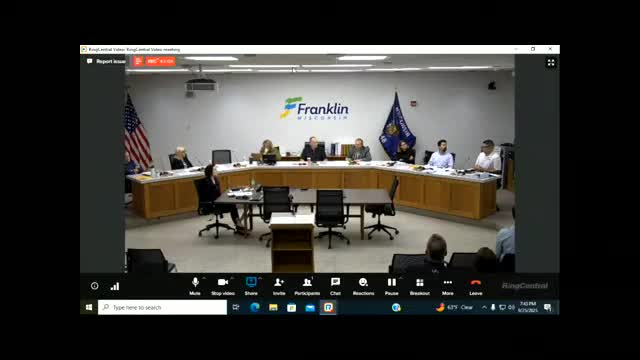Franklin Council Debates Conditional Use Permit Amid Litigation Concerns
September 26, 2025 | Franklin City, Milwaukee County, Wisconsin
This article was created by AI summarizing key points discussed. AI makes mistakes, so for full details and context, please refer to the video of the full meeting. Please report any errors so we can fix them. Report an error »

The Special Common Council meeting held on September 25, 2025, in Franklin, Wisconsin, focused on ongoing discussions regarding conditional use permits and the implications of potential litigation involving the Franklin School District. The meeting was marked by a series of statements from council members addressing concerns about the legal and procedural aspects of the permits.
The session began with a council member expressing the need for further discussion on special use permits related to lighting and natural resource exceptions. They emphasized the importance of addressing these issues transparently, noting that the right to litigate is available to both the school district and residents.
A significant portion of the meeting was dedicated to the legal framework surrounding conditional use permits. A council member highlighted Wisconsin state statute 62.23, which mandates that permits must be granted if applicants meet specified conditions supported by substantial evidence. This evidence must be factual and not based on public opinion or speculation. The council member stressed that the city has a responsibility to ensure that any conditions imposed are backed by substantial evidence.
Concerns were raised about the perceived pressure from external parties, with one member stating that the council has faced intimidation tactics. They argued that decisions made by the council are based on thorough deliberation and community input, and that litigation threats should not deter the council from fulfilling its duties.
Another council member questioned the fairness of handling litigation discussions in open versus closed sessions, suggesting that the council should consistently approach such matters with transparency. They also pointed out the potential financial implications of ongoing litigation, noting that increased insurance claims could lead to higher taxes for residents.
The meeting concluded with a reminder of the importance of reasonable conditions for permits, which must relate to legitimate land use concerns. The council acknowledged the need for compromise and the potential consequences of adverse rulings in court, which could strip the city of its ability to impose conditions on permits.
Overall, the meeting underscored the complexities of balancing community interests, legal obligations, and the potential for litigation as the council navigates the approval process for conditional use permits. The discussions highlighted the ongoing challenges faced by the council in addressing the needs of the community while adhering to legal requirements.
The session began with a council member expressing the need for further discussion on special use permits related to lighting and natural resource exceptions. They emphasized the importance of addressing these issues transparently, noting that the right to litigate is available to both the school district and residents.
A significant portion of the meeting was dedicated to the legal framework surrounding conditional use permits. A council member highlighted Wisconsin state statute 62.23, which mandates that permits must be granted if applicants meet specified conditions supported by substantial evidence. This evidence must be factual and not based on public opinion or speculation. The council member stressed that the city has a responsibility to ensure that any conditions imposed are backed by substantial evidence.
Concerns were raised about the perceived pressure from external parties, with one member stating that the council has faced intimidation tactics. They argued that decisions made by the council are based on thorough deliberation and community input, and that litigation threats should not deter the council from fulfilling its duties.
Another council member questioned the fairness of handling litigation discussions in open versus closed sessions, suggesting that the council should consistently approach such matters with transparency. They also pointed out the potential financial implications of ongoing litigation, noting that increased insurance claims could lead to higher taxes for residents.
The meeting concluded with a reminder of the importance of reasonable conditions for permits, which must relate to legitimate land use concerns. The council acknowledged the need for compromise and the potential consequences of adverse rulings in court, which could strip the city of its ability to impose conditions on permits.
Overall, the meeting underscored the complexities of balancing community interests, legal obligations, and the potential for litigation as the council navigates the approval process for conditional use permits. The discussions highlighted the ongoing challenges faced by the council in addressing the needs of the community while adhering to legal requirements.
View full meeting
This article is based on a recent meeting—watch the full video and explore the complete transcript for deeper insights into the discussion.
View full meeting
